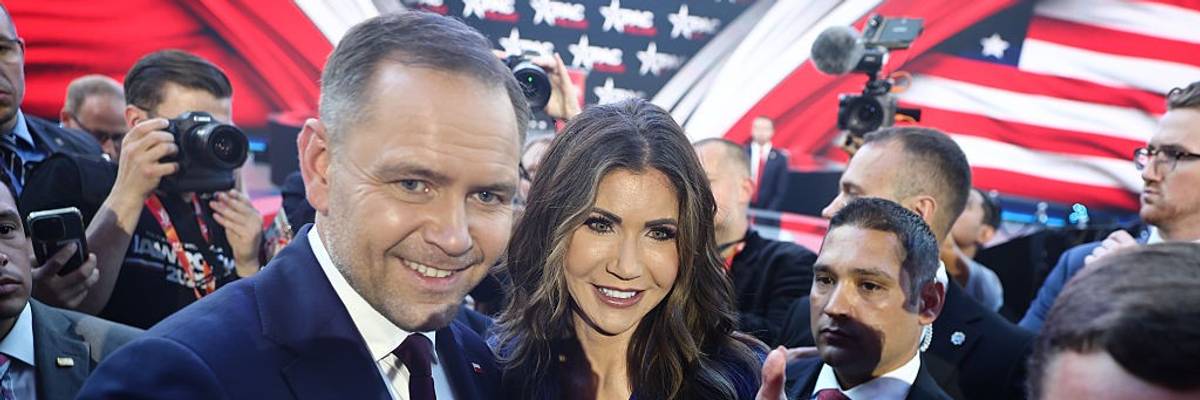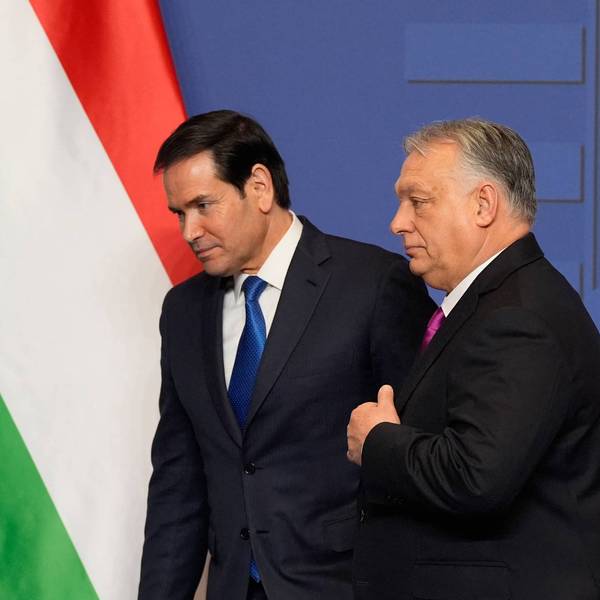
Karol Nawrocki and U.S. Secretary of Homeland Security Kirsti Noem attended the Conservative Political Action Conference in Jasionka, Poland on May 27, 2025.
Far-Right Karol Nawrocki, Backed by Trump and Orbán, Wins Polish Presidency
"Nawrocki's win has given pro-Donald Trump, anti-liberal, anti-E.U. forces across the continent a shot in the arm."
Far-right candidate Karol Nawrocki emerged Monday as the narrow winner of Poland's presidential election, a contest in which the Trump administration in the U.S. and Hungary's authoritarian leader, Viktor Orbán, weighed in on the side of their ideological compatriot.
Nawrocki's victory over Rafał Trzaskowski, the Warsaw mayor who was representing the party of Polish Prime Minister Donald Tusk, was celebrated by right-wing figures around the world, including Orbán and Jordan Bardella, the head of France's far-right National Rally party.
"The Polish people have spoken and their free and democratic choice must be respected, including by the Brussels leaders who ardently hoped for their defeat," Bardella wrote on social media following news that Nawrocki, a historian and "former football hooligan" backed by Poland's Law and Justice Party, prevailed in one of the closest elections in the country's history.
Nawrocki's win came days after U.S. Homeland Security Secretary Kristi Noem endorsed him during a speech at a Conservative Political Action Conference (CPAC) gathering in Poland last week.
"[U.S. President] Donald Trump is a strong leader for us, but you have an opportunity to have just as strong of a leader in Karol if you make him the leader of this country," said Noem. "If you elect a leader who will work with President Trump, the Polish people will have a strong ally. You will continue to have a U.S. military presence here... and you will have equipment that is American-made, high quality."
In early May, Nawrocki met with Trump in the Oval Office in what was seen as a show of support from the White House ahead of the election.
Franziska Davies, assistant professor of Eastern and Central-Eastern European History at the Ludwig Maximilian University of Munich, wrote that Nawrocki's win is "bad news for Poland, for Europe, for Ukraine, and for democracy."
As the Financial Times reported, "Nawrocki ran a campaign centred on conservative Catholic values and rhetoric attacking the E.U.'s stance on migration and climate change."
"The 42-year-old is a political ally of Hungary's premier Viktor Orbán and other Eurosceptic populists, and has suggested that he could seek to alter Poland's strongly pro-Ukraine stance, as one of the NATO alliance's most important Eastern members," FT added. "While Poland's prime minister holds more political power, the president can block legislation, and nominates senior posts such as the central bank governor."
Adam Simpson, senior lecturer in International Studies in Justice and Society at the University of South Australia, warned Monday that the ensuing "legislative gridlock could well see Law and Justice return to government in the 2027 general elections, which would lock in the anti-democratic changes the party made during their last term in office from 2015–2023."
"This included eroding Poland's judicial independence by effectively taking control of judicial appointments and the Supreme Court," Simpson added. "Nawrocki's win has given pro-Donald Trump, anti-liberal, anti-E.U. forces across the continent a shot in the arm. It's bad news for the E.U., Ukraine, and women."
An Urgent Message From Our Co-Founder
Dear Common Dreams reader, The U.S. is on a fast track to authoritarianism like nothing I've ever seen. Meanwhile, corporate news outlets are utterly capitulating to Trump, twisting their coverage to avoid drawing his ire while lining up to stuff cash in his pockets. That's why I believe that Common Dreams is doing the best and most consequential reporting that we've ever done. Our small but mighty team is a progressive reporting powerhouse, covering the news every day that the corporate media never will. Our mission has always been simple: To inform. To inspire. And to ignite change for the common good. Now here's the key piece that I want all our readers to understand: None of this would be possible without your financial support. That's not just some fundraising cliche. It's the absolute and literal truth. We don't accept corporate advertising and never will. We don't have a paywall because we don't think people should be blocked from critical news based on their ability to pay. Everything we do is funded by the donations of readers like you. Will you donate now to help power the nonprofit, independent reporting of Common Dreams? Thank you for being a vital member of our community. Together, we can keep independent journalism alive when it’s needed most. - Craig Brown, Co-founder |
Far-right candidate Karol Nawrocki emerged Monday as the narrow winner of Poland's presidential election, a contest in which the Trump administration in the U.S. and Hungary's authoritarian leader, Viktor Orbán, weighed in on the side of their ideological compatriot.
Nawrocki's victory over Rafał Trzaskowski, the Warsaw mayor who was representing the party of Polish Prime Minister Donald Tusk, was celebrated by right-wing figures around the world, including Orbán and Jordan Bardella, the head of France's far-right National Rally party.
"The Polish people have spoken and their free and democratic choice must be respected, including by the Brussels leaders who ardently hoped for their defeat," Bardella wrote on social media following news that Nawrocki, a historian and "former football hooligan" backed by Poland's Law and Justice Party, prevailed in one of the closest elections in the country's history.
Nawrocki's win came days after U.S. Homeland Security Secretary Kristi Noem endorsed him during a speech at a Conservative Political Action Conference (CPAC) gathering in Poland last week.
"[U.S. President] Donald Trump is a strong leader for us, but you have an opportunity to have just as strong of a leader in Karol if you make him the leader of this country," said Noem. "If you elect a leader who will work with President Trump, the Polish people will have a strong ally. You will continue to have a U.S. military presence here... and you will have equipment that is American-made, high quality."
In early May, Nawrocki met with Trump in the Oval Office in what was seen as a show of support from the White House ahead of the election.
Franziska Davies, assistant professor of Eastern and Central-Eastern European History at the Ludwig Maximilian University of Munich, wrote that Nawrocki's win is "bad news for Poland, for Europe, for Ukraine, and for democracy."
As the Financial Times reported, "Nawrocki ran a campaign centred on conservative Catholic values and rhetoric attacking the E.U.'s stance on migration and climate change."
"The 42-year-old is a political ally of Hungary's premier Viktor Orbán and other Eurosceptic populists, and has suggested that he could seek to alter Poland's strongly pro-Ukraine stance, as one of the NATO alliance's most important Eastern members," FT added. "While Poland's prime minister holds more political power, the president can block legislation, and nominates senior posts such as the central bank governor."
Adam Simpson, senior lecturer in International Studies in Justice and Society at the University of South Australia, warned Monday that the ensuing "legislative gridlock could well see Law and Justice return to government in the 2027 general elections, which would lock in the anti-democratic changes the party made during their last term in office from 2015–2023."
"This included eroding Poland's judicial independence by effectively taking control of judicial appointments and the Supreme Court," Simpson added. "Nawrocki's win has given pro-Donald Trump, anti-liberal, anti-E.U. forces across the continent a shot in the arm. It's bad news for the E.U., Ukraine, and women."
Far-right candidate Karol Nawrocki emerged Monday as the narrow winner of Poland's presidential election, a contest in which the Trump administration in the U.S. and Hungary's authoritarian leader, Viktor Orbán, weighed in on the side of their ideological compatriot.
Nawrocki's victory over Rafał Trzaskowski, the Warsaw mayor who was representing the party of Polish Prime Minister Donald Tusk, was celebrated by right-wing figures around the world, including Orbán and Jordan Bardella, the head of France's far-right National Rally party.
"The Polish people have spoken and their free and democratic choice must be respected, including by the Brussels leaders who ardently hoped for their defeat," Bardella wrote on social media following news that Nawrocki, a historian and "former football hooligan" backed by Poland's Law and Justice Party, prevailed in one of the closest elections in the country's history.
Nawrocki's win came days after U.S. Homeland Security Secretary Kristi Noem endorsed him during a speech at a Conservative Political Action Conference (CPAC) gathering in Poland last week.
"[U.S. President] Donald Trump is a strong leader for us, but you have an opportunity to have just as strong of a leader in Karol if you make him the leader of this country," said Noem. "If you elect a leader who will work with President Trump, the Polish people will have a strong ally. You will continue to have a U.S. military presence here... and you will have equipment that is American-made, high quality."
In early May, Nawrocki met with Trump in the Oval Office in what was seen as a show of support from the White House ahead of the election.
Franziska Davies, assistant professor of Eastern and Central-Eastern European History at the Ludwig Maximilian University of Munich, wrote that Nawrocki's win is "bad news for Poland, for Europe, for Ukraine, and for democracy."
As the Financial Times reported, "Nawrocki ran a campaign centred on conservative Catholic values and rhetoric attacking the E.U.'s stance on migration and climate change."
"The 42-year-old is a political ally of Hungary's premier Viktor Orbán and other Eurosceptic populists, and has suggested that he could seek to alter Poland's strongly pro-Ukraine stance, as one of the NATO alliance's most important Eastern members," FT added. "While Poland's prime minister holds more political power, the president can block legislation, and nominates senior posts such as the central bank governor."
Adam Simpson, senior lecturer in International Studies in Justice and Society at the University of South Australia, warned Monday that the ensuing "legislative gridlock could well see Law and Justice return to government in the 2027 general elections, which would lock in the anti-democratic changes the party made during their last term in office from 2015–2023."
"This included eroding Poland's judicial independence by effectively taking control of judicial appointments and the Supreme Court," Simpson added. "Nawrocki's win has given pro-Donald Trump, anti-liberal, anti-E.U. forces across the continent a shot in the arm. It's bad news for the E.U., Ukraine, and women."

